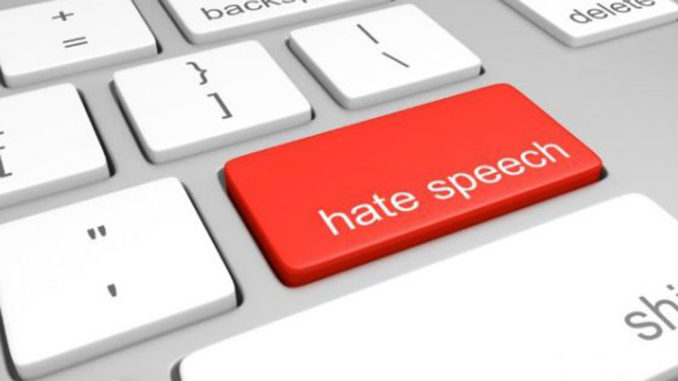
THE Senate slid further into impropriety last week when it ushered a monstrous anti-hate speech bill through its first reading. Draconian and nebulous, it prescribes harsh punishment, ranging from five years’ imprisonment to execution, for alleged speech offences, and leaves room for state officials to abridge constitutionally-guaranteed fundamental freedoms. The immediate push-back by horrified citizens should intensify and all stakeholders should challenge this gratuitous assault on rights to freedom of thought and expression.
The misbegotten National Commission for the Prohibition of Hate Speech (Establishment) Bill 2019 was introduced by Senate Deputy Chief Whip, Sabi Abdullahi, but some suspect the unmistakable fingerprints of the increasingly intolerant Muhammadu Buhari administration. Apart from its nebulous definition of hate speech, the bill specifies penalties that include life imprisonment, death by hanging, 10 years’ imprisonment and fines of up to N10 million. None of the draconian decrees churned out under the military era came up even close with such ghoulish weapon against free speech.
Freedom of expression is recognised as a fundamental human right and enshrined in the Universal Declaration of Human Rights, the International Covenant on Civil and Political Rights and other global pacts, and codified in the Nigerian constitution. Under these, along with other basic rights, the “freedom to seek, receive and impart information and ideas of all kinds regardless of frontiers, either orally, in writing or in print, in the form of art, or through any other medium of his choice” is sacrosanct to the individual and underpins democracy.
Under the Buhari presidency, an onslaught on basic rights is underway and its spokesmen have never hidden their impatience with opposing views and criticism. As supposed representatives, legislators ought to protect the people, not acquiesce in supine deference to a tyrannous Executive agenda. The sponsors also demonstrate poor judgement by attempting to set up yet another extra-ministerial cost centre, an anti-hate speech commission, at a time the almost 600 ministries, departments and agencies have become an unbearable fiscal burden.
To be clear, hate speech has become a cause for concern worldwide, presenting autocratic regimes with further armour to constrain and oppress opponents but mature democracies with the dilemma of balancing preserving freedoms with curbing their abuse. The United Nations defines it as speech that attacks a person or group on the basis of protected attributes such as race, religion, ethnic origin, sex, disability or sexual orientation. To avoid clashing with basic rights and in the light of violence against some groups, some countries narrow it down to speech that incites violence against a target group or person. The UN identifies inciting broadcasts by politicians and media outlets as a prelude to the Rwandan genocide that claimed over 800,000 lives in a three-month long killing spree. In Europe, Australia and the Americas where memories of Nazism and its genocide against Jews, Gipsies and Slavs are stark; and where anti-Semitism, right wing extremism, Islamic extremism and homophobia reacting to assertive gay rights have polarised the society, anti-hate speech laws have been enacted to protect the vulnerable and contain violence.
The aim, however, is not to gag opponents or stamp out free speech. Elsewhere, the right to air views is not the target, but to protect the weak. Australia’s laws vary by state jurisdiction and seek specifically to prevent victimisation against groups; Canada criminalises advocating genocide against any group or inciting hatred, while, in 2017, Germany updated its laws to criminalise speech that violates the constitutional rights of any individual or group. European countries have longstanding laws against denying the holocaust. Even then, democracies spell out even-handed penalties: Canada’s genocide law carries a maximum sentence of five years jail and inciting hatred a maximum of two years jail; Belgium’s attracts one year jail term.
The US First Amendment expressly forbids hate speech laws and this has been repeatedly affirmed by the courts and hateful speech is covered by normal criminal and civil laws. This also applies in Europe where the European Council applies civil laws and public enlightenment to tackle rising intolerance.
A report for Brookings Institution in 2018 recalled that offensive and hateful speech has long been a problem in Nigeria, saying that “in a heterogeneous and a polarised” country, incitement, such as the “quit notice” given in June 2017 to Igbo to leave the North, raised tensions and hampered the economy. It, however, notes the difficulty in identifying the line between hate and merely offensive speech.
Instead of making obnoxious laws that can be abused by an intolerant Executive, the National Assembly should address the fundamental flaws in the 1999 Constitution that tend to keep Nigeria’s ethnic nationalities apart. National integration is forged by justice and appropriate political structure and not by fiat. Nigeria has enough laws to contain unwholesome speech that verges on a criminal activity; laws on defamation, libel and harassment are also available for law enforcement and civil litigation. The Senate should quash the bill immediately; lawmakers should aspire to take the country into the club of successful liberal democracies. It is only autocratic and theocratic states that criminalise free speech, Nigeria is neither. The space should be made more robust for popular participation, not restricted to shield temporary occupants of public office from criticism or alternative views. The country is floundering, wracked by insecurity, poverty, lack of infrastructure and functional social services; more than ever before, therefore, citizens need to be encouraged in this multinational and multicultural society to ventilate their views.
To curb excesses, regulators like the Nigerian Broadcasting Commission and the Nigerian Communications Commission should enforce existing and new regulations and deploy new skills and the latest technological tools to keep pace with current realities. The hate speech bill should be killed and buried and civil society needs to remain on high alert to prevent assaults on fundamental freedoms.
END

Be the first to comment